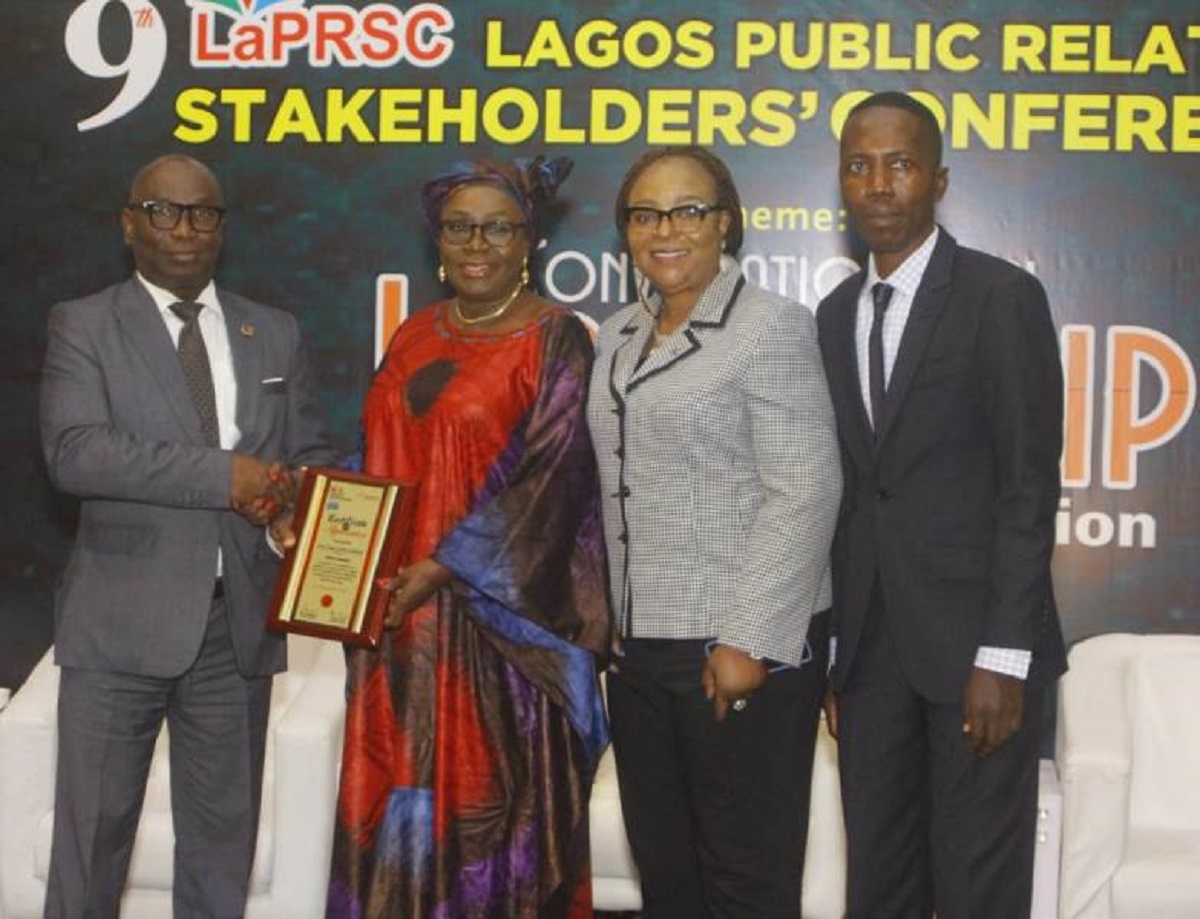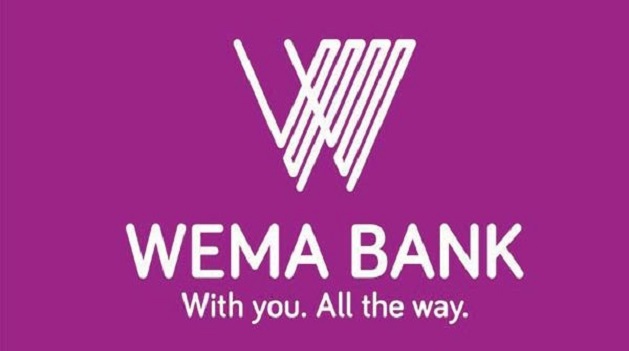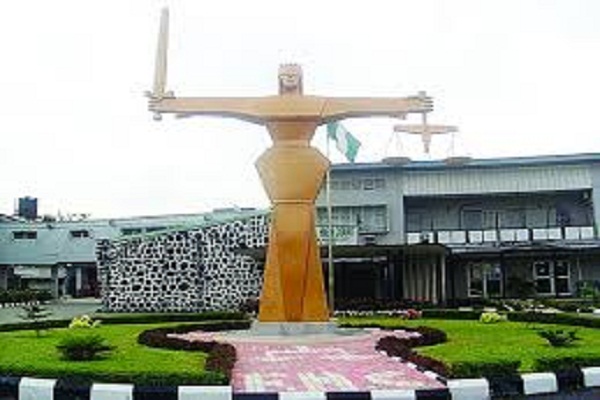General News
LaPRSC: Danbatta Highlights Why Nigerians Must Explore Opportunities in the Digital Economy to Eradicate Poverty

Professor Umar Garba Danbatta, Executive Vice Chairman/ CEO, Nigerian Communications Commission, on Thursday addressed the 9th Lagos Public Relations Stakeholders’ Conference on Leadership and Poverty Eradication.

L-R: Mr Sina Thorpe, Council Member, NIPR; Mrs Nnena Ukoha, Head, Corporate Communications, NCC: Mrs Comfort Obot Nwankwo, Chairman, NIPR Lagos and Conference Convener, Mr Olabamiji Adeleye, Lead Consultant, Addefort Limited at the 9th Lagos PR Stakeholders’ Conference on Leadership and Poverty Eradication on Thursday August 18, 2022.
The EVC, represented by Mrs Nnena Ukoha, Head, Corporate Communications, called on Nigerians to explore opportunities in the Digital Economy to eradicate poverty in the country.
Speaking on the topic, Poverty Eradication in Nigeria: Leveraging Opportunities in a Digital Economy, he noted that ”For most developing countries, particularly those with large populations, inadequate infrastructure has made it difficult to participate as equal partners in the worldwide enterprise of knowledge production and dissemination.
“This portends an unequal distribution of access, resources and opportunities in this new economy, the Digital Economy.
“To avert the birth of a new type of poverty (Information Poverty), the ICT gap (digital divide) between the developed and developing nations must be bridged.”
That Nigeria like most developing nations is not enjoying the full benefits of the ICT revolution due to inadequate telecommunication infrastructure, capacity to maintain existing infrastructure, and policies for equitable public participation as producers and consumers of information and knowledge.
“A nation’s development is measured in economic terms such as per capita income, Gross Domestic Product (GDP), and Gross National Product (GNP), among other indices. Indices such as level of literacy, social development, human capital development, cultural innovation and technological preparedness are not regarded as a measure of development. If we must tap into the ICT revolution, then it is time for a paradigm shift! The traditional economic terms are not a reflection of the new age of the Digital Economy “he said.
On efforts made by the Nigerian government, “There are several past and ongoing efforts by the Nigerian Government to alleviate poverty through ICT using organizations and programmes like the National Information Technology Agency (NITDA), using the offices of the Nigerian Postal Service (NIPOST) across the country as ICT hubs, the Universal Service Provision Fund (USPF) to ensure that telecommunications services are accessible to the widest number of people (and communities) at affordable prices.
USPF has poverty-reducing activities like the Community Resource Centers, USPF Hackathon, RUBI – Rural Broadband Initiative, UnICC – University InterCampus Connectivity, BTS – Base Transceiver Stations, IRC – Information Resource Centres, SKC – School Knowledge Centres, and the E-Health Project. “
The EVC said that “NCC will continue to support the vision of the present government to put Nigeria amongst the top twenty in the comity of Nations and to align our developmental goals in keeping with the seventeen United Nations Sustainable Development Goals (SDGs) but particularly the goal to eradicate extreme poverty for all people everywhere which is currently measured as people living on less than $1.25 a day, by year 2030.
He listed initiatives at the NCC directly or indirectly target poverty eradication to include;
“Advanced Digital Appreciation Programme: Transforming the Academics: Advanced Digital Appreciation Programme for Tertiary Institutions, ADAPTI is aimed at bridging the digital divide existing in academia with the provision of computers and other ICT facilities to equip the lecturers and other experts in order to improve ICT skills and also to enrich the students.
“The overriding objective of this intervention has been to elicit the pervasive application of ICT skills in academia for enhanced staff output, institutional efficiency, and student enculturation to e-based learning for sustainable national growth.”
“Digital Awareness Programme (DAP): this is a special intervention programme to address the digital information knowledge gap in the country, especially among the teeming youthful population. On the last count, the DAP Project supports 229 Secondary Schools across the Six (6) Geopolitical Zones of Nigeria, including the Federal Capital Territory.
“The strategy in this programme is to expose schools and colleges to Information and Communications Technology (ICT) awareness, usage and application by facilitating access to ICT tools by the provision of twenty one (21) Desktop Computers, Local Area Network, Printers, Scanners, VSAT Dish and deployment of one Year Bandwidth Subscription for Internet Access.”
“NCC- Digital Bridge Institute (DBI) Projects: Nigeria’s ICT flagship institution, the Digital Bridge, DBI, came into existence in 2004 to impact on the national ICT human capital building efforts by bridging the ICT knowledge gap.”
“Frequency Auction: Contributing to National Purse: The Nigerian telecom regulator has contributed to the Federation Account from proceeds of frequency auctions and licensing.
“The frequencies auctioned, are in turn used for the deployment of services for poverty reduction and the benefit of the citizenry. The Commission has a clear understanding of this value chain and is determined to uphold it. “
“Value Added Services (VAS): Telecommunication has given birth to several value-added services that open up benefits to all cadre of people irrespective of location and level of education.
“These VAS are great channels for revenue generation. Some VAT are content development, Phone repair network, IT device accessories sales market (phone pouches, screen covers etc), Ringback tones, and even government agencies providing service on telecom platform e.g NAFDAC – drug authentication code. “
On broadband and poverty , “The Nigerian National Broadband Plan 2020–2025 (the “Broadband Plan”) devotes an entire section to targets, strategies and roadmaps to promote pervasive broadband deployment, increased broadband adoption, usage and availability to all at affordable prices.
“These all point to government’s commitment to harmonizing and utilizing the benefits derivable from ICT for the good of all. “
“In 2020, the latest National Broadband Plan was approved to foster fuller economic exploitation of ICTs. This means that there will be more pervasive deployment and usage of ICT to push the development and economic attractiveness of the nation.”
He assured that The Federal Government of Nigeria is committed to sustainable development of the ICT subsector for the growth of the economy and the eradication of poverty.
“This was made evident during the just concluded Communications sector retreat where the Ministry of Communications and the agencies under it converged to chart a five-year plan that would make communications services, affordable, accessible, and available to all persons in Nigeria.”
He concluded that “The credit for Nigeria’s ambitious broadband pursuit is traced to the potentials and prospects of broadband technology, the ease of deployment and the vast opportunities available through it.
“The Commission will continue to put strategies in place to pursue last mile deployment of broadband. This would ensure small businesses are positioned to compete globally and communities and individuals are able to create wealth through access to ICT.”
“By providing access to information, making markets more efficient, fostering social inclusion, and equalizing opportunities in rural areas, ICT offers an innovative and unprecedented tool to directly reduce poverty.”
Other speakers at the event include; Founder and Chairman, Heirs Holdings, Mr Tony Elumelu; Mr Segun Ajayi-Kadir, Director General, Manufacturers Association of Nigeria (MAN); Sheila Ojei, Director Strategy, Funding and Stakeholders Management, LSETF; The Commissioner for Women Affairs and Poverty Alleviation, Lagos State, Mrs Cecilia Bolaji Dada and Dr Oluseye Ajuwon, Economist and Consultant, University of Lagos.
General News
Wema Bank Plans N2M Grant to Empower Women

Innovative financial institution and pioneer of Africa’s first fully digital bank, Wema Bank, has reaffirmed its commitment to advancing women’s empowerment by partnering with the SheCan Conference for the fifth consecutive year.

The collaboration has announced it would empower women with N2 million grant during the 6th edition of SheCan 6.0. conference, that will be held on July 18, 2025, at Balmoral, Federal Palace Hotel, Lagos.
The event is expected to host over 7,000 women under the theme “SheCan Do More.”
Announcing this partnership, Wema Bank through its women-focused platform, SARA by Wema, said it will be awarding ₦2 million in business grants to support women entrepreneurs within the SARA Community.
This grant is to support small and medium businesses within the SARA Community to scale up their business.
Ayodele Olojede, Head, Retail and SME Banking at Wema Bank, said, “Wema Bank is committed to empowering women entrepreneurs by providing the financial backing, tools, training, and networks they need to scale sustainably. Year after year, we’ve seen the incredible ripple effect that access, and opportunity can create in the lives of women and their communities.
“Through SARA by Wema, our goal is to create an environment where Nigerian women can dream bigger, build stronger, and lead the economy with confidence. This partnership with SheCan is a statement of belief in the power of women to transform society.”
“This year’s partnership represents more than sponsorship; it is a tangible investment in helping Nigerian women build sustainable businesses, scale their impact, and contribute meaningfully to economic growth.
“Eligible applicants must be women-led businesses with active Wema Bank accounts and must be registered members of the SARA Community.
“Interested participants are required to submit a written pitch of no more than two pages, detailing their business and founder story, the problem being solved, target audience and competitive advantage, proposed use of the grant, and the expected outcomes and community impact. Entries must also include the applicant’s Wema Bank account number, full name, and the email address used to join the SARA Community.”
General News
Unlicensed Investment Firms Fall Hard in Lagos Court

Justice D.I. Dipeolu of the Federal High Court in Ikoyi, Lagos, has convicted two companies, FARM360 Limited and MCBHADMOS Trans-Atlantic Trade Limited, for illegal capital market operations.

The Economic and Financial Crimes Commission (EFCC) disclosed that the companies were arraigned on June 16 by the Lagos Zonal Directorate 2 of the EFCC on a five-count charge for operating collective investment schemes without valid licences from either the Central Bank of Nigeria (CBN) or the Securities and Exchange Commission (SEC).
The charges allege that between 2021 and 2022, the firms collected approximately N80 million from several investors but failed to refund the money or pay accrued interest. One of the counts stated that the companies operated without a valid licence to conduct investment management, violating Section 57 of the Banks and Other Financial Institutions Act 2020.
The companies pleaded not guilty, but EFCC investigator Nnadikwu Izuchukwu Collins presented evidence that included a petition from investors who claimed the firms promised high returns through agricultural and forex trading investments. The petition revealed the group invested a total of N93 million.
Investigations showed neither FARM360 nor MCBHADMOS held the necessary licences from the SEC or CBN. A Fidelity Bank statement revealed that the N80 million received was used for personal purposes. The directors of both companies remain at large, with efforts underway to apprehend them.
The prosecution submitted bank statements, the investor petition, and official correspondence with the CAC, CBN, and SEC as evidence, all of which were admitted by Justice Dipeolu.
The court convicted both companies on all counts and imposed fines of N5 million per count.
In a related case, the court also convicted Quintessential Investment Company Limited for similar illegal capital market activities, following its arraignment on two counts of operating collective investment schemes without CBN approval.
General News
Burna Boy Distances Himself from Meme Coin, Labels Crypto as Fraud

Burna Boy, Grammy-winning Nigerian artist, has publicly distanced himself from a meme coin circulating online that falsely uses his name and image for promotion.

Burna Boy
In a statement shared via Instagram, the Afrobeats star made it clear that he has no involvement in any cryptocurrency ventures, describing such schemes as fraudulent.
His comments come amid growing traction of a meme coin allegedly linked to him, which has been circulating on social media platform X (formerly Twitter).
“I don’t do any internet ‘coin’ business. I see it as fraud and I have no interest in any of that,” Burna Boy wrote. “So if you see anyone using my name for such, please disregard or report them.”
The singer urged fans to remain vigilant and to report anyone promoting the crypto project under false pretenses.

 Broadcasting2 days ago
Broadcasting2 days agoNigeria Week Ahead: Inflation, Oil and Naira in focus

 News2 days ago
News2 days agoEFCC: Accusations Against Our Chairman Are Baseless and Misleading

 Telecom1 day ago
Telecom1 day agoMTN Nigeria Targets $1Bn Cloud Market with Largest Modular Data Centre

 Telecom1 day ago
Telecom1 day agoNCC Introduces N10m Licence Fee for Bulk SMS Service

 E-Business1 day ago
E-Business1 day agoFirm Highlights Top Risks of Quantum Computing

 General News1 day ago
General News1 day agoAM Best Reaffirms Stable Outlook for Cyber Insurance Market

 General News1 day ago
General News1 day agoBurna Boy Distances Himself from Meme Coin, Labels Crypto as Fraud

 General News1 day ago
General News1 day agoWoodhall Capital and Partners Launch ₦1.5Bn Fund























